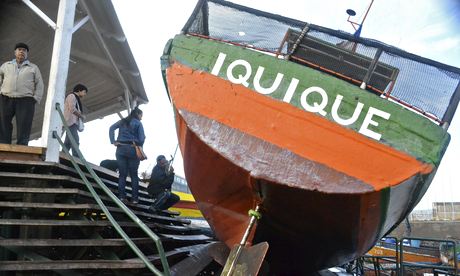
Authorities in northern Chile have discovered surprisingly light damage and just six reported deaths from the magnitude-8.2 earthquake that hit the country on Tuesday - a remarkably low toll for such a major event.
President Michelle Bachelet flew to the region to review damage in daylight after declaring a state of emergency, and deploying a small military force to prevent looting and round up more than 300 inmates who escaped from a women's prison in the city of Iquique, forcing the closure of the border with Peru.
The quake was centred under the Pacific ocean, 61 miles north-west of Iquique, and struck at 8.46pm as thousands of residents were arriving home from work.
As sirens blared and emergency warnings urged residents to evacuate by foot to higher ground, traffic jams built up in coastal cities as alarmed residents sought to move away from the seafront. . A tsunami measuring 2.5 metres (8.2ft) flooded low-lying areas of Iquique including a medical clinic and bus terminal.
As thousands of people evacuated from low-lying areas were returning home on Wednesday, an ad hoc security force of police and members of the Chilean armed forces searched Iquique for the estimated 329 female prisoners thought to have escaped. Initial reports from Chilean investigative police said 16 prisoners had been apprehended. Firefighters, meanwhile, battled a huge blaze in central Iquique and the lack of water and electricity added to a sense of chaos.
Reports of damage to infrastructure and homes began filtering in during the early hours of Wednesday. Several highways were blocked by rockslides and the airport control tower in Iquique has been damaged.
Strong aftershocks shook northern Chile every few minutes early Wednesday, some measuring above magnitude six. Earthquake experts at the Universidad de Chile predicted aftershocks would continue for months.
Bachelet immediately announced a visit to northern Chile and confirmed that Brazil, Peru and Argentina had offered material support.
The president, who took office in mid-March, sought to avoid a repeat of her widely criticised reaction to a deadly earthquake during a previous stint as president. An magnitude 8.8 earthquake off the coast of Chile on 27 February 2010 killed an estimated 500 Chileans and caused a massive tsunami that government officials had told coastal residents would not happen.
When the huge wave - measuring up to 60ft high - hit, it destroyed large swaths of the Chilean coastline and blemished Bachelet's previously stellar reputation.
Over the past four years, the Chilean government has repeatedly held tsunami practice drills and earthquake of magnitude 6.7 on 16 March prompted the evacuation of more than 100,000 people in Iquique. Dozens of small tremors in recent weeks have kept northern Chilean residents on edge.
Given that three of the 10 largest earthquakes ever recorded have been in Chile, the populace is long accustomed to earthquake survival protocols. Building standards in Chile require multiple-storey buildings to be capable of withstanding a 9.0 earthquake, though in rural areas many older buildings - often made of adobe - are prone to sudden and often deadly collapse.
Tuesday's quake was so strong that the shaking experienced in Bolivia's capital about 290 miles away was the equivalent of a magnitude-4.5 tremor, authorities there said.
But it was not the 'big one' seismologists expect to hit the region at some point. 'Could be tomorrow, could be in 50 years; we do not know when it's going to occur. But the key point here is that this magnitude-8.2 is not the large earthquake that we were expecting for this area. We're actually still expecting potentially an even larger earthquake,' said Mike Simons, a seismologist at the Geological Survey.
Post By http://www.theguardian.com/world/2014/apr/02/chile-earthquake-apparent-low-level-casualties
0 comments Blogger 0 Facebook
Post a Comment